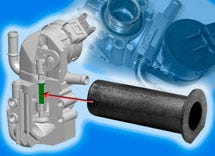Operating at temperatures of up to 220°C, bushings made of DuPont's Vespel TP polyimide replace metal and promise to combine friction and wear performance with a low coefficient of thermal expansion to allow consistently smooth operation of the valves, including their fast and precise opening and closing. Molded by Gustav Wahler GmbH & Co.
January 25, 2010
Operating at temperatures of up to 220°C, bushings made of DuPont's Vespel TP polyimide replace metal and promise to combine friction and wear performance with a low coefficient of thermal expansion to allow consistently smooth operation of the valves, including their fast and precise opening and closing. Molded by Gustav Wahler GmbH & Co. KG (Esslingen, Germany) for use in four- and six-cylinder stratified-charged petrol engines, the bushings position and guide the cylindrical operating rods of EGR (Exhaust Gas Recirculation) slip-in valves. Located behind the pre-catalytic converter, the bushings must regulate the quantity of exhaust gases recirculated into the combustion air to reduce NOx emissions.
|
Low-wear, low-friction injection molded bushings, made of DuPont Vespel TP polyimide, are used to guide the operating rods of EGR poppet valves, replacing metal bushings. |
DuPont says that compared to equivalent metal components, the injection molded Vespel parts are chemically inert to the residues contained within exhaust gases so no contact corrosion occurs. Additional benefits include significantly lower weight and high stiffness and tensile strength. Injection molding allows reduced wall thicknesses for additional design freedom.
Developed in tandem by Gustav Wahler and DuPont, DuPont handled simulation of the long, thin-walled molded part's behavior under servicing and temperature loads, from a cold start to full throttle. The molder says these simulations helped it to optimize material usage to such an extent that very little installation space is required: considerably less than that needed by a metal bearing. —[email protected]
About the Author(s)
You May Also Like



